London dispersion forces - Study guides, Class notes & Summaries
Looking for the best study guides, study notes and summaries about London dispersion forces? On this page you'll find 290 study documents about London dispersion forces.
Page 4 out of 290 results
Sort by
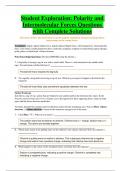
-
Student Exploration: Polarity and Intermolecular Forces Questions with Complete Solutions
- Exam (elaborations) • 9 pages • 2024
- Available in package deal
-
- $9.99
- + learn more
Student Exploration: Polarity and Intermolecular Forces Questions with Complete Solutions Directions: Follow the instructions to go through the simulation. Respond to thequestions and prompts in the orange boxes. Vocabulary: dipole, dipole-dipole force, dipole-induced dipole force, electronegativity, intermolecular force, ionic bond, London dispersion force, molecule, nonpolar, nonpolar covalent bond, partial charges, polar, polar covalent bond, valence electron Prior Knowledge Question...
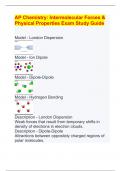
-
AP Chemistry: Intermolecular Forces & Physical Properties Exam Study Guide
- Exam (elaborations) • 5 pages • 2024
- Available in package deal
-
- $12.99
- + learn more
AP Chemistry: Intermolecular Forces & Physical Properties Exam Study Guide Model - London Dispersion Model - Ion Dipole Model - Dipole-Dipole Model - Hydrogen Bonding Description - London Dispersion Weak forces that result from temporary shifts in density of electrons in electron clouds. Description - Dipole-Dipole Attractions between oppositely charged regions of polar molecules.
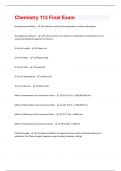
-
Chemistry 113 Final Exam Questions Perfectly Answered!!
- Exam (elaborations) • 8 pages • 2024
- Available in package deal
-
- $7.99
- + learn more
Homogeneous Mixture - A mixture in which the composition is uniform throughout Heterogeneous Mixture - A mixture that is not uniform in composition; components are not evenly distributed throughout the mixture. SI Unit of Length - Meter (m) SI Unit of Mass - Kilogram (kg) SI Unit of Time - Second (s) SI Unit of Temperature - Kelvin (K) SI Unit of Amount - Mole (mol) Meter to Nanometer (nm) conversion factor - 10^-9 (1m = 1,000,000,000 nm) Meter to Micrometer (um) conversion factor - 10^...

-
Inorganic Chemistry 2 Exam Review With 100% Correct Answers 2024
- Exam (elaborations) • 10 pages • 2024
- Available in package deal
-
- $11.49
- + learn more
Inorganic Chemistry 2 Exam Review With 100% Correct Answers 2024 1) Which of the following statements about gases is false? A) All gases are colorless and odorless at room temperature. B) Distances between molecules of gas are very large compared to bond distances within molecules. C) Gases expand spontaneously to fill the container they are placed in. D) Gases are highly compressible. E) Non-reacting gas mixtures are homogeneous. - answerA) All gases are colorless and odorless at room ...
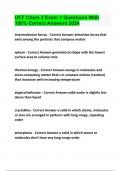
-
UCF Chem 2 Exam 1 Questions With 100% Correct Answers 2024
- Exam (elaborations) • 19 pages • 2024
- Available in package deal
-
- $16.99
- + learn more
UCF Chem 2 Exam 1 Questions With 100% Correct Answers 2024
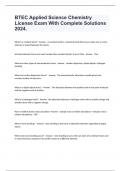
-
BTEC Applied Science Chemistry License Exam With Complete Solutions 2024.
- Exam (elaborations) • 4 pages • 2024
- Available in package deal
-
- $9.99
- + learn more
What is a covalent bond? - Answer A covalent bond is a chemical bond that occurs when one or more electron is shared between the atoms. all intermolecular forces are much weaker than covalent bonds. True or False - Answer True. What are three types of intermolecular forces - Answer London dispersion, dipole-dipole, hydrogen bonding What are London dispersion forces? - Answer The intermolecular attractions resulting from the constant motion of electrons. What is a dipole-dipol...
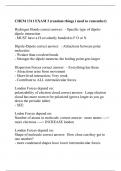
-
CHEM 1311 EXAM 3 (random things i need to remember)
- Exam (elaborations) • 3 pages • 2023
- Available in package deal
-
- $9.99
- + learn more
Hydrogen Bonds correct answer: - Specific type of dipole-dipole interaction - MUST have a H covalently bonded to F O or N Dipole-Dipole correct answer: - Attractions between polar molecules - Weaker than covalent bonds - Stronger the dipole moment, the boiling point gets larger Dispersion Forces correct answer: - Everything has these - Attractions arise from movement - Short-lived interaction; Very weak - Contribute to ALL intermolecular forces London Forces depend on: ...
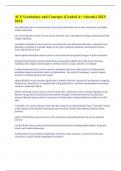
-
ACS Vocabulary and Concepts (Graded A+ Already) 2023-2024.
- Exam (elaborations) • 11 pages • 2024
- Available in package deal
-
- $10.29
- + learn more
intermolecular forces correct answers forces that hold molecules to other molecules (not bonds within molecules) ion-ion interaction correct answers occurs between ions, with opposite charges attracting and like charges repelling ion-dipole interaction correct answers occur between ions and polar molecules, where the ion is attracted or repelled to a partial charge in the polar molecules (includes interactions between water and dissolved ions) dipole-dipole interaction correct answers o...
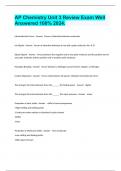
-
AP Chemistry Unit 3 Review Exam Well Answered 100% 2024.
- Exam (elaborations) • 4 pages • 2024
- Available in package deal
-
- $7.99
- + learn more
Intermolecular Forces - Answer Forces of attraction between molecules ion-Dipole - Answer Forces of attraction between an ion and a polar molecule. Na+ & Cl- Dipole-Dipole - Answer Forces between the negative end of one polar molecule and the positive end of one polar molecule and the positive end of another polar molecule. Hydrogen Bonding - Answer Forces between a Hydrogen and a Fluorine, Oxygen, or Nitrogen London Dispersion - Answer Forces exist between all species. Wea...
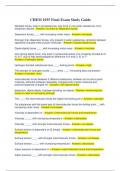
-
CHEM 1035 Final Exam Study Guide
- Exam (elaborations) • 14 pages • 2023
-
- $9.99
- + learn more
CHEM 1035 Final Exam Study Guide Weakest forces, exist in all substances, only force in non-polar substances, form temporary dipoles - Answer<>London or Dispersion forces Dispersion forces ____ with increasing molar mass - Answer<>increase Stronger than dispersion forces, only present in polar substances, attraction between oppositely charges ends of polar molecules - Answer<>Dipole-dipole forces Dipole-dipole forces ____ with increasing molar mass - Answer<>incre...

Do you wonder why so many students wear nice clothes, have money to spare and enjoy tons of free time? Well, they sell on Stuvia! Imagine your study notes being downloaded a dozen times for $15 each. Every. Single. Day. Discover all about earning on Stuvia


